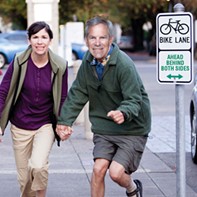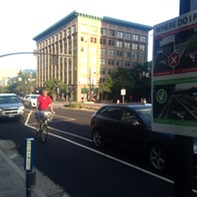Mayor Maybe
Despite re-election bid, Becker has forgotten what city he governs
By John Saltas @johnsaltasOur first downtown office in Salt Lake City was in the former Shubrick Building on the corner of West Temple and 400 South. The Shubrick was home to the renowned nightspot Port O' Call and, at various times, a pet store, a barbershop, a live-music agency, a tattoo parlor, a caterer, and a cluster of residents in the upstairs apartments. It was a lively area.
Today, it's not so lively, and upon the old Shubrick site sits the most gorgeous and secure mausoleum the world has ever known: the new Federal Courthouse Building. Progress.
We moved into that space in 1991, when Palmer DePaulis was mayor of Salt Lake City. DePaulis was appointed mayor in 1985 when the position was vacated by Ted Wilson, who took a position at the University of Utah. Ted, or maybe Wayne Owens, was Utah's closest version of a Kennedy, an aspiration of many politicians of the 1960s and 1970s—dashing, daring, you know the drill. Since Wilson was first elected in 1976, only Democrats have served in Salt Lake City's top spot. That's nearly a 40-year run during which no one can say, "Mormons and Republicans run everything in Utah."
Well, you sort of can, since Wilson and Ross "Rocky" Anderson (SLC mayor from 2000 to 2008) both have LDS roots. It's unknown if either are on the current membership rolls of the LDS Church and thus part of the uptick in the Mormon populace that was recently reported in The Salt Lake Tribune. DePaulis, Deedee Corradini (SLC mayor from 1992 to 2000), and current Mayor Ralph Becker (since 2008) are not LDS. Indeed, DePaulis was Salt Lake City's first Catholic mayor.
He was later re-elected as mayor (evidence he was doing something right—like planting the seeds of what would become a blossoming downtown, including persuading Utah Jazz owner Larry Miller not to relocate to the suburbs). He has always been, to his credit and bane, an advocate for the poor and homeless in Salt Lake City. So much so that, if you gave him a robe and a cardinal hat, he'd fit right in at Pope Francis' morning coffee clatch.
It's to his credit because advocating for, then acting to, the benefit of the homeless, is often a lonely and noble cause; and it's to his bane because to this day, his efforts to centralize the entire homeless community in a district bounded by Pioneer Park and Rio Grande Street on Salt Lake City's near west side has flummoxed developers and potential, yet cautious, new residents for decades.
The large personalities of Corradini and Anderson blotted out much of whatever accomplishments occurred during their watch. Corradini—architect of The Gateway, advocate of Trax development, and the seller of a portion of Main Street to the LDS Church—is best remembered as being central to major scandals that lasted her entire two terms: the Olympic bribery scandal, the Bonneville Pacific financial imbroglio that sent her peers to jail, then Giftgate, where she narrowly escaped prosecution herself for the ethical breach of accepting hundreds of thousands of dollars in cash from donors to pay off personal debts.
Rocky Anderson put the Olympic scandal to rest by becoming chummy with Mitt Romney and was soon the flag-waving beacon of the 2002 Salt Lake City Olympic Games. He championed gay and lesbian causes, human rights and drinking rights. I believe he won all those fights. But when the second Gulf War began in 2003, it took Rocky with it. For the next five years, Rocky was less a citizen of Salt Lake City as he was of his outspokenly defined world. "That pothole can wait—President Bush is a traitor and must be tried for war crimes" is a fair summary of everything that Rocky said up to 2008, when he decided not to seek a third term. He had the city in the palm of his hands, so popular was he, but he forgot his city was Salt Lake, not Baghdad.
Is that a bad thing? Not really. He stood for something, like it or not, same as DePaulis and same as Corradini. Today, I find less fault in what Rocky said, and more in what he did: He opened the door for a mayor to jump in and out of Salt Lake City at his own leisure—a trait Rocky was good at, but one that the emulating Ralph Becker has failed miserably at. Rocky had a strong voice and panache. Ralph has a wonk voice and a bicycle helmet.
We were talking a while back about a potential new feature in City Weekly called Where's Ralph? We'd kind of GPS him all over the place and, of course, the only place you'd never find him would be City Hall. New York? Check. And we'd go, "Glad we found you, Ralph. How's the vacay? Can you give us an update on the Sugar House rail line? (You like subways better. Got it.) How you feelin' about the bike lanes on 300 South? (You don't eat or shop on 300 South anyway. Check.) But your citizens want leadership—why didn't you paint the first new lane, you know, like tossing the first spade of dirt on a new construction? (Paint is bad for the environment and you had tickets to Kinky Boots.) All right, then, now we're getting somewhere!
Are you ever going to say anything about the escapades going on in your building and on the City Council? No? Why not? Because I don't need to and, golly, everyone has a skeleton in their closet, right? Thanks, Ralph, final question: Why are you running for mayor again? Why else? To piss off Luke Garrott. Gotta go. It's intermission.
More by John Saltas
-
Instead of a Statue of Responsibility, Utah could build a statue of shame depicting Mike Lee.
Private Eye
- Apr 17, 2024
-
Utah's Statue of Responsibility invites high-brow thinking, and a few low-brow jokes.
Private Eye
- Apr 10, 2024
-
John Stockton's entitled to his privacy and his COVID opinions, but not false facts.
Private Eye
- Mar 27, 2024
- More »








